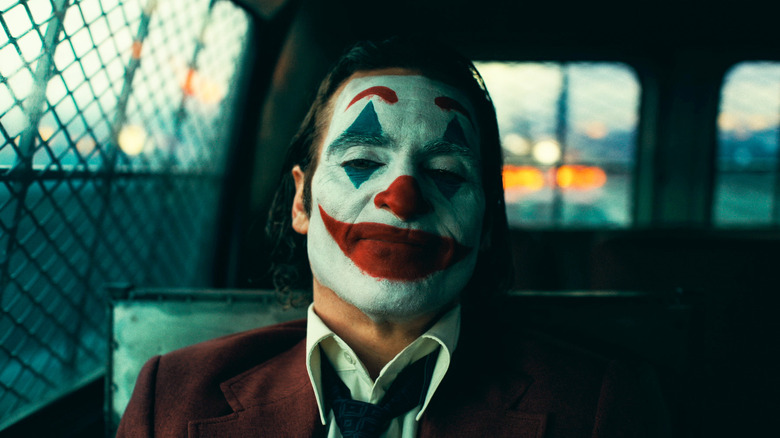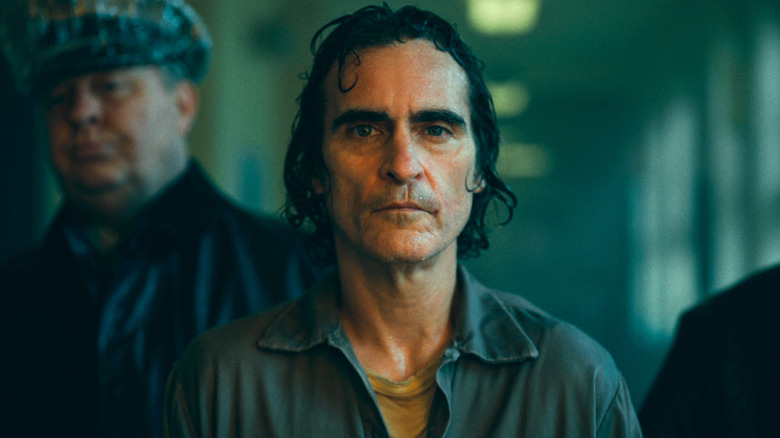Joker 2 Answers One Of The Biggest Questions About The First Movie
Todd Phillips' "Joker" is the most divisive film to ever gross over $1 billion worldwide. This might sound like a strange thing to say about a film that was nominated for 11 Academy Awards and won two, but many of the film's detractors absolutely abhor the film. There are several reasons for this (one of them being certain critics' knee-jerk hatred of all things comic book related), but Phillips' most egregious offense might've been paying aggressive homage to Martin Scorsese's "Taxi Driver" and "The King of Comedy." These are two of the most emotionally scarring character studies of psychically damaged loners ever put to film; they're peak Scorsese, and they are not to be touched by a filmmaker best known for his rowdy R-rated comedies about men who, in their way, are every bit as dangerous to society as Travis Bickle and Rupert Pupkin.
The problem with "Joker" for me is that it is, like most of Phillips' movies, undeniably well directed and not exactly enamored of its messed up male characters. The main trio of "Old School" is largely harmless by the end of the film, but "The Hangover" trilogy is an unrepentant, drain-swirling depiction of toxic masculinity that seems to hate its characters as much as we kind of do by the conclusion of the third movie.
Phillips' misanthropy sloshes over the bile-crusted rim of the cracked whiskey glass that is "Joker," and I squeamishly admire the film for going as hard as it does – even though I think it's one of the most misread dark comedies since David Fincher's "Fight Club." Unfortunately, in making $1 billion worldwide, this means Phillips and his star/co-conspirator Joaquin Phoenix were obligated to further explore the broken brain of Arthur Fleck. In doing so, they felt they owed their fans answers to questions that the Scorsese films intentionally left dangling.
All that stuff really happened
During a pre-screening Q&A attended by /Film's Bill Bria (who also reviewed the movie), Phillips and co-screenwriter Scott Silver discussed their approach to the musical mélange of "Joker Folie à Deux." While kicking around ideas during the pandemic, Phillips thought it would be "fun" to give fans of the first movie some concrete answers. As he told the audience at the screening;
"A lot of people thought in the first one, a lot of people say to me, 'What was real, what was...' And he had a lot of fantasies in the first movie. This movie really finds Arthur, answers everything as far as, well, that movie really happened. All that stuff really happened. He really killed Murray Franklin, [played by] Robert De Niro. He really killed those kids on the subway. And here he is, ready to face the music, for lack of a better word, and sort of pay for the crimes that he committed. So it's a very logical two years later in movie world where we find Arthur, and I'm going to leave it at that."
"Very logical" doesn't feel like a logical treatment of a character as erratic and downright savage as the Joker, so it'll be interesting to see how fans feel about Phillips and Silver's tack. For those who loathed "Joker," this will no doubt used as a cudgel to bash the first film's travestying of "Taxi Driver" and "The King of Comedy," two films that are interested less in the consequences of their protagonists' actions, than the internal and external pressures that drive them to such shocking extremes. So there's every reason to expect a thrillingly inflamed discourse. Get ready to rumble all over again, if that's your thing.

